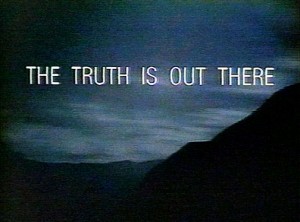April 17th, 2011 by Elaine Schattner, M.D. in Opinion
No Comments »

Recently Ed Silverman of Pharmalot considers the case of a ghost-written medical text’s mysterious disappearance. The 1999 book, “Recognition and Treatment of Psychiatric Disorders: A Psychopharmacology Handbook for Primary Care,” (reviewed in a psychiatry journal here) came under scrutiny last fall when it became evident that the physician “authors” didn’t just receive money from a relevant drug maker, SmithKline Beecham; they received an outline and text for the book from pharmaceutical company-hired writers.

poster for the X-Files
Now the book’s listing is gone from the website of STI (Scientific Therapeutic Information), the company that provided the authorship “help.” I tried to get a copy of the handbook on Amazon.com, where it’s currently out-of-stock. The book is listed in the Library of Congress on-line catalog: #99015420.
I’m reminded of clinical handbooks I used all the time when I was practicing hematology and oncology. At the hospital, I’d get freebie, small-sized chemo regimen primers that conveniently fit into my white coat pocket. In retrospect, perhaps I didn’t adequately check the authors’ credentials on those mini-book sources. It was too easy to take that information and keep it at hand, literally, especially in the times before we had constant Web access. Read more »
*This blog post was originally published at Medical Lessons*
November 4th, 2010 by Bryan Vartabedian, M.D. in Better Health Network, Opinion
No Comments »

It’s the great migration to digital. And as civilization makes its move, the pharmaceutical industry is trying to figure out how to reach out to physicians. Pharmaceutical reps are slowly becoming a thing of the past. Branded medication portals leave most doctors cold. Email outreach is marginal.
Pharma strategists ask me how to reach doctors in the new world. I don’t have an answer. It isn’t that I can’t come up with an answer. It’s just that a good one doesn’t exist. Why?
Doctors aren’t anywhere right now. They’re stuck somewhere between the analog and digital. Socially they’re nebulous. Their virtual communities are non-existent. Public social networks are sparsely populated. When they participate they watch and rarely create or discuss. Our profession is going through a lot right now and it’s evident in anemic digital adoption. Read more »
*This blog post was originally published at 33 Charts*
October 17th, 2010 by Peter Lipson, M.D. in Better Health Network, Health Tips, Opinion, Quackery Exposed, Research
No Comments »

If you google “low testosterone” you’ll see lots of ads for testosterone replacement. Some are from pharmaceutical companies that sell testosterone, others from obvious snake-oil salesmen.
Both types of ads list vague sets of symptoms, encourage you to believe that they are pathologic, and want to sell you something to make you better. For example, the pharmaceutical company Solvay gives you a handy guide for speaking to your doctor, and a quiz to see if you have “low T.” The quiz asks some questions that may be useful, but also asks very general questions about your sense of well being. Read more »
*This blog post was originally published at Science-Based Medicine*
October 13th, 2010 by GarySchwitzer in Better Health Network, Expert Interviews, Health Policy, News, Opinion, Video
No Comments »

Next week, the National Press Foundation offers an “all-expenses-paid, educational program on cancer issues” for journalists, with all expenses paid by Pfizer. I’ve written several times about my criticism of this approach.
The National Press Foundation has offered to let me speak at next week’s event or at a subsequent all-expenses-paid program for journalists on Alzheimer’s disease also underwritten by Pfizer.
I’m unable to attend either event because of prior commitments, but suggested to NPF that they ask Merrill Goozner to speak instead. He’s right in Washington, has written and lectured about conflicts of interest in healthcare, and was available. Goozner told me he has not been contacted. So, since I can’t attend and since critical voices probably won’t be represented at the first workshop, I have posted some video clips of what others might have said if given the opportunity. Read more »
*This blog post was originally published at Gary Schwitzer's HealthNewsReview Blog*
October 7th, 2010 by DrRob in Better Health Network, Health Policy, Opinion
No Comments »


I used to defend pharmaceutical companies. ”What companies out there have contributed more good? Should care manufacturers make more when all they do is make transportation that breaks after a few years?”
It made sense to me that you should put a pot of gold at the end of the rainbow so that companies are motivated to invent more drugs and innovate. We throw a lot of money to athletes and movie stars who simply entertain us, shouldn’t we do better to those who heal us? I used to say that. I don’t anymore.
No, I don’t think the drug companies are “evil.” People who say that are thinking way to simplistic. These companies are doing exactly what their shareholders want them to do: make as much money as possible for as long as possible. That’s what all companies do, right? They are simply working within the system as it is and trying to accomplish the goal of making money. To say that they should “sacrifice” is foolish. They are simply playing by the rules that have been set out there. Those rules are the thing that has to change. Read more »
*This blog post was originally published at Musings of a Distractible Mind*

















